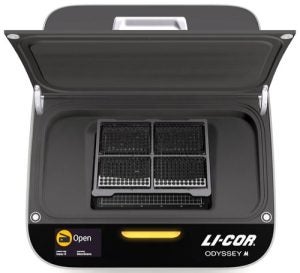Centralized Research Core Facility (CRCF)
– Instrumentation Updates
– Demonstrations, Seminars and Workshops
CRCF Instrumentation Update – Summer 2023
Two state-of-the-art Liquid chromatography–mass spectrometry (LC–MS) instruments, the Agilent 6470B Triple Quadrupole and Thermo Orbitrap Exploris 240, were installed in the Spring, with a combined cost of one million dollars, bringing significant advancements to the CRCF‘s analytical capabilities. LC–MS is a highly powerful technique used for the separation, identification, and quantification of both known and unknown compounds. Additionally, it aids in elucidating the structure and chemical properties of various molecules. The Agilent 6470B LC/MS system’s vacshield technology greatly reduces the cleaning cycle and the Agilent Jet Stream (AJS) provides exceptional detection limits down to the sub-femtogram level, enabling a wide range of sample analyses with utmost sensitivity. The new Thermo Orbitrap Exploris 240 LC/MS system’s capabilities and features intelligent acquisition of high-resolution accurate-mass data, providing fast, high-quality results and caters to small molecule analysis, protein profiling, quantitative protein analysis, detailed protein characterization, and intact protein analyses. Notably, the Orbitrap technique employed by this system enables high-resolution analyses of up to 240,000, which is currently unmatched in the market. Moreover, the Thermo Scientific Orbitrap Exploris 240 boasts a unique database that can accommodate the specific needs of our laboratory, particularly for characterizing small molecules, peptides, and proteins.
CRCF Demonstrations, Seminars, and Workshops – Spring and Winter 2023
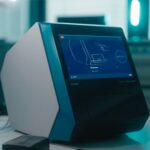
NanoTemper’s Monolith X (MOX) biophysical instrument workshop on February 7, 2023 demonstrated easy efficient measurements of the strength between two binding partners, by combining microscale thermophoresis and spectral shift technologies to enable analysis of protein, DNA, RNA, and small molecule interactions. The simplified capillary-based sample system requires only 10uL of sample volume per point and can produce a 16-point equilibrium affinity curve in less than 10-minutes. Coupled with current temperature control technology and precision sample compartment engineering, allowed for quick analysis of van’t Hoff interaction enthalpies.

During the demonstration, six research groups from URI, Brown, and Bryant had the opportunity to explore the interactions between their respective molecules. Benjamin Piraino (Bridge ’20, SURF ’18) from URI’s Jodi Camberg lab, investigated the interaction between the E. coli antitoxin MqsA and the proteolytic complex ClpXP, aiming to elucidate the degradation of MqsA. Tess Puopolo (SURF ’18-19) and Huifang Li, from Navindra Seeram‘s lab, examined the interactions between P2X Purinoceptor 7 and Cannabinoids, as well as PD-L1 and cannabidiol.
Considering the demand from researchers statewide, RI-INBRE’s CRCF applied for supplemental funds (PA-20-272, Administrative Supplements to Existing NIH Grants and Cooperative Agreements) to acquire the Monolith X instrument. The Monolith X complements our existing Surface Plasmon Resonance (SPR) technology by combining isothermal spectral shift measurement with MST technology, further enhancing our capabilities in molecular interaction analysis.
New Installations – Fall 2022
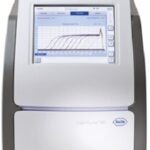 The Roche LightCycler 96 has been purchased to replace the Applied Biosystems Viia7. The LightCycler 96 is ideal for absolute and relative gene expression quantification, melt curve analysis, and endpoint genotyping.
The Roche LightCycler 96 has been purchased to replace the Applied Biosystems Viia7. The LightCycler 96 is ideal for absolute and relative gene expression quantification, melt curve analysis, and endpoint genotyping.
The new EVOS M7000 Cell Imaging System was installed at the Centralized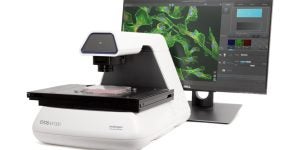 Research Core Facility (CRCF) in March of 2022 and replaced the EVOS FL Auto imaging system. The new fully automated imaging system incorporates monochrome and color high-resolution cameras to optimize fluorescent and colorimetric imaging.
Research Core Facility (CRCF) in March of 2022 and replaced the EVOS FL Auto imaging system. The new fully automated imaging system incorporates monochrome and color high-resolution cameras to optimize fluorescent and colorimetric imaging.
CRCF Demonstrations, Seminars, and Workshops – Fall 2022
A Workshop for FILM Microscope STELLARIS 8 FALCON took place from September 5th to the 9th. CRCF users had the opportunity to interact with Leica’s STELLARIS 5 with individual demonstrations. They were able to collect data and images using Leica’s new cutting-edge confocal platform.
A live demonstration of the Odyssey M Multimodal Imager was conducted October 11th-12th. Several research groups prepared and ran samples on Leica’s Odyssey M including Hannah Trautmann from Dr. Kathryn Ramsey’s lab who examined gene expression in bacteria using VSV-G Epitope tag antibody. Dr. Marina Ayrapetov from Dr. Gongqin Sun’s lab was interested in imaging MEK and pMEK antibodies in her cancer biology research.
An Artificial Intelligence Imaging Analysis Seminar employed Leica’s AIVIA software to guide microscopy image analysis and visualization over two days from September 27th to the 28th. Cody Keating, from Leica North Carolina, introduced the AIVIA image analysis platform, which can complete 2D to 5D image visualization, analysis, and interpretation for highly complex images in minutes.
On October 11th and 12th, LI-CORE Biosciences demonstrated their Odyssey M Multimodal Imager at the CRCF. Researchers were impressed with the multimodal imager’s ability to combine the technology of a Western blot imager, plate reader, slide scanner, luminescence imager, and more. The all-in-one system allows performing membrane-, plate-, gel-, and slide-based assays!
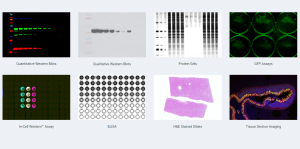
A ‘truckload’ of Instrumentation Demonstrations!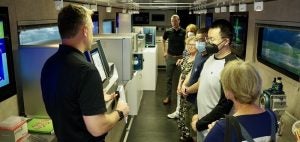
Sciex’s Technology Tour stopped by the Kingston campus of the University of Rhode Island on Monday, June 27, 2022, to demonstrate their latest equipment. Several research groups visited the mobile facility from 10 am to 3 pm and left with great experiences. The instrumentation on display included: Mass Spectrometry ZenoTOF 7600, 7500 Triple Quad, Echo MS, and Capillary Electrophoresis System BioPhase 8800.
Island on Monday, June 27, 2022, to demonstrate their latest equipment. Several research groups visited the mobile facility from 10 am to 3 pm and left with great experiences. The instrumentation on display included: Mass Spectrometry ZenoTOF 7600, 7500 Triple Quad, Echo MS, and Capillary Electrophoresis System BioPhase 8800.
The Search for a New Mass Spectrometer – Demonstrations in 2022
In the search for a new Mass Spectrometer, three online demonstrations were conducted this the spring of 2022 with Agilent, AB Sciex, and ThermoFisher, when their latest models were introduced. Future implementation of the Mass Spectrometer is expected in 2023.
Gator Bio, a pioneer in Bio-Layer Interferometry (BLI) technology, provided a demonstration of their Gator Prime instrument at the CRCF in March. BLI detects biomolecular interactions of a variety of biomolecules including small molecules, antibodies, and other proteins. Our users had opportunities to load their samples on the BLI instrument for analysis.
A successful Mica imaging platform demonstration took place from May 25th to June 10th, allowing researchers to utilize the instrumentation. The world’s first Microhub and new type of imaging system, was launched in March by Leica.
AIVIA software, a complete 2-to-5D image visualization software, was exhibited on June 9th. AIVIA is related to the Mica and brings advanced data analysis to biologists without computer science expertise! CRCF user projects applied were from animal tissues to plant root tips and included nine research groups with about 22 attendees.

